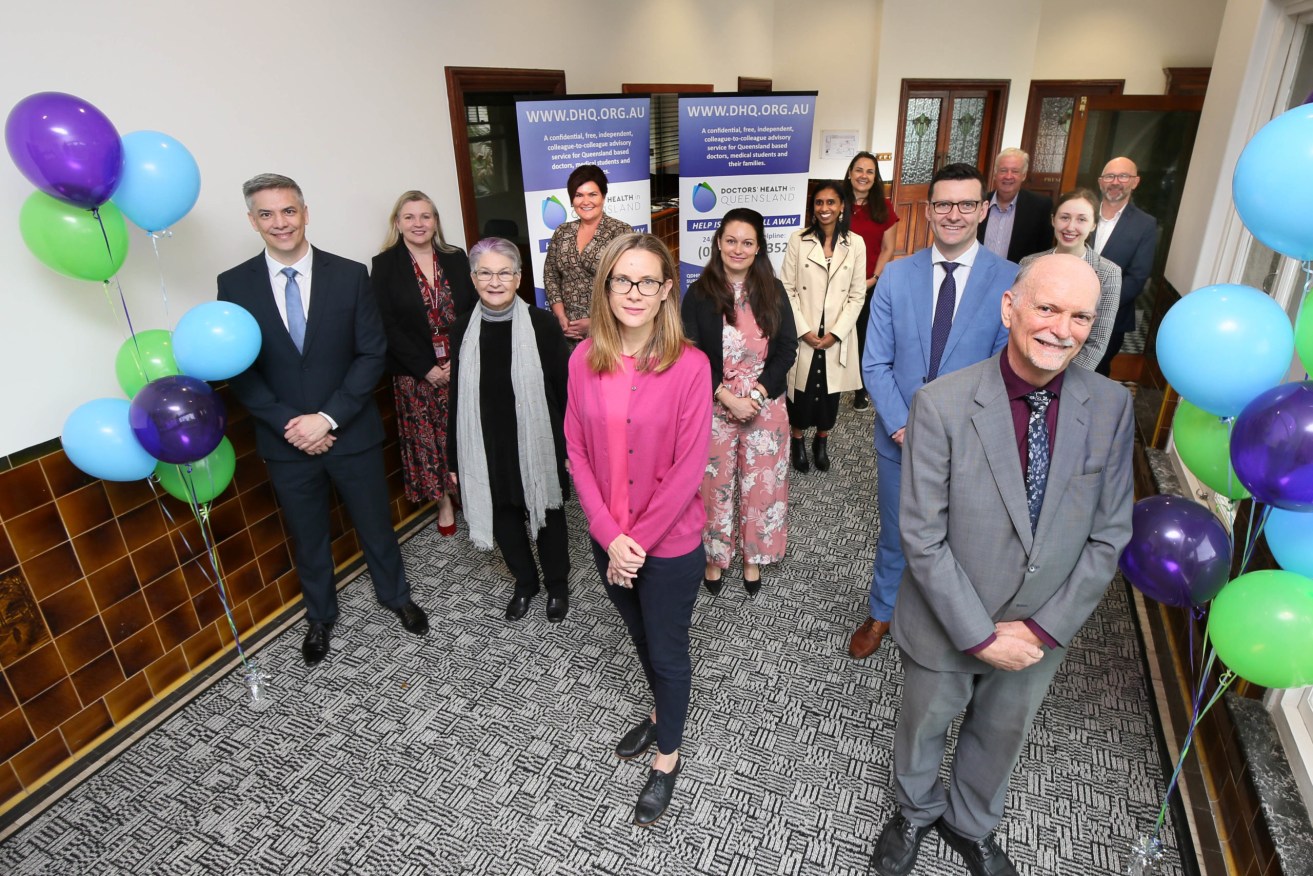New counselling service aims to keep our doctors healthy
A 24-hour counselling helpline for Queensland doctors is anticipating higher demand for its services as the state’s medical workforce continues operating in high-stress environments fuelled by the global pandemic.


Dr Jon Paul Khoo and Dr Ross Phillipson are Brisbane psychiatrists who volunteer their time with other GPs and psychiatrists to support doctors and medical students through Doctors Health Queensland, the state’s only medical-to-medical professional support service. (Photo: Richard Waugh)
While Queensland currently has COVID-19 contained to a handful of active cases, the challenges facing our frontline medical staff are far from over, according to Doctors Health in Queensland (DHQ) medical director Dr Margaret Kay.
Her organisation, which celebrated its 31st birthday last week with a name change from the Doctors’ Health Advisory Service (Qld), was established to offer a free emergency helpline to those in the medical industry seeking external support in times of crisis.
Kay says the mental health of doctors and other professionals on the medical frontline has been highlighted due to the public’s heightened need for trusted advice and care.
“Physical and mental wellness is a major factor in the delivery of safe, high-quality patient care and the challenge is to enable wellness in the workplace, not just during a pandemic but all year round,” Kay said.
“There has been a real groundswell of support for health care workers over the past few months, and the realisation that it is of paramount importance that we help doctors look after their health because they’re needed for the long haul.
“Research shows that doctors with healthy personal lifestyle habits are more likely to impart healthy behaviours to their patients.”
Stanthorpe doctor Dan Halliday, who saw his community battle bushfires last summer amid a chronic, still unresolved water shortage, believes Queensland, not unlike other states, is facing significant challenges to its economic, social and general health and well-being.
Rural doctors, he says, are often the first point of contact for people experiencing anxiety and stress.
“Many Queenslanders are still dealing with the hardship of drought. More than two thirds of Queensland is drought declared – even after decent early year rain,” he told InQueensland.
“In addition to that, the effects of bushfire fires over the past 12-18 months are still being felt.
“My own community of Stanthorpe has been on ‘day zero’ water supplies since December last year – there is no sign of that letting up.”
Halliday says those continuing hardships in the bush have only been compounded by the effects of the COVID-19 pandemic.
The chair of RDAQ Foundation, a medical charity to promote good health in rural Queensland, says the long-acknowledged under-investment in rural health and subsequent pressure on health service delivery, has been highlighted as a result of COVID-19.
“RDAQ Foundation applauds the work our rural colleagues are doing to keep their communities going at this time,” Halliday said.
“We acknowledge the teams that they are apart of and the vital role they play, providing crucial rural and remote health services in a time of health and economic strain.
“RDAQ Foundation continues to support in principle, and in practice, the need for rural medical practitioners to maintain their own health and wellbeing, not just for themselves, but their families and communities.”
Psychiatrist Dr Jon-Paul Koo says the stress doctors face is a combination of long hours, difficult decision-making, responsibility for life-and-limb, high expectations, reduced capacity for self-care and work-life balance, and the constant fear of litigation.
“Furthermore, those same personality variables that predicted their entry into the medical profession can reduce their capacity to manage their own distress: dedication, self-sacrifice, a strong work-ethic, the ability to put to the side their own wishes and needs, perfectionism, and the need to be seen as adequate and capable,” Koo said.
DHQ founder, Dr Diana Khursandi, now a retired anaesthetist, says the mental health risk is even higher in rural and regional areas, with country doctors taking on higher patient workloads while forgoing medical care to the detriment of their own health
“In rural, regional and remote areas there is no choice of workload – you have to deal with whatever comes through the door,” Khursandi said.
“In areas with smaller populations, the difficulty of consulting another doctor is increased by the fact that there are a smaller number of colleagues, maybe only one or two who would know each other well, resulting in less choice.”
Kay agrees, adding that doctors will often ignore their own symptoms because they have a waiting room of people needing their care and feel bad if they need to take time off to look after themselves.
“Improving doctors’ health has benefits not just for the doctors themselves, but also their patients and the teams they work with,” Kay said.
“While doctors are often portrayed as being challenging patients, in reality there are a lot of complexities and barriers that can make it hard for doctors to look after themselves; they work long hours, there’s a culture of self-sacrifice, and for those in rural and regional areas, a difficulty in accessing care due to geographical isolation.
Khursandi says modern technology has aided the work being done by DHQ to help doctors in rural areas, including support and educational services.
“Telehealth has increased access to specialised support, and video conferencing, especially well developed in this time of Covid-19, such as Zoom, has further enhanced the ability of providers to support regional, rural and remote doctors when they seek help,” she said.
Halliday says DHQ has been a valued contributor to the health and well-being of Queensland doctors for many years.
“We welcome the DHAS(Q) transition to Doctors Health in Queensland (DHQ) and encourage the continued fostering of relationships that support doctors to maintain their own health, while looking after the communities we serve,” he said.
“The RDAQ Foundation congratulates Doctors Health in Queensland on the work they are doing, and hope to see their efforts continue, and be valued, for the foreseeable future.”












